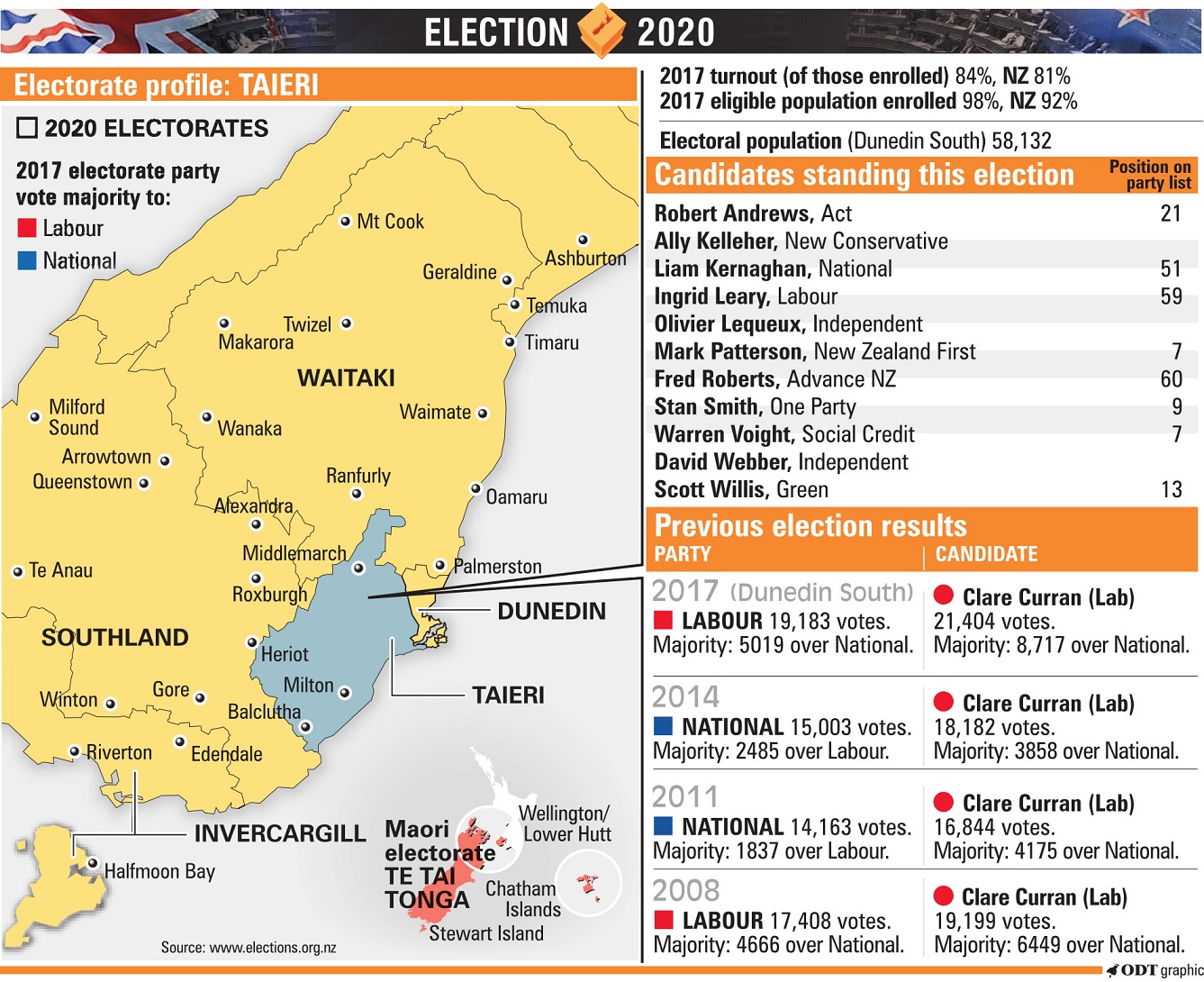
Only one National Party candidate has ever won a southern Dunedin seat, Jim Barnes triumphing in St Kilda in 1951 and 1954.
Despite that daunting history, National is quietly confident of achieving a significant surprise in the newly formed Taieri seat.
"Newly formed" is the key to the party’s optimism.
The old Dunedin South seat became progressively more rural in recent years due to boundary changes, and Taieri continues that process, the seat sprawling to include Lawrence, Balclutha and Kaitangata.
It brings in country booths which traditionally favour National, and some left-leaning urban booths have shifted to the new Dunedin seat.
Having won the party vote twice in Dunedin South in the past three elections, National’s hopes in Taieri — while certainly ambitious — are not beyond the realm of possibility.
The seat may well come down to which party does best in harnessing the electorate’s considerable elderly vote.
Census data shows Taieri with more people than the national average in every age bracket from 45-49 on; it ranks 5th in 80-84-year-olds and third in 85+.
Many of those voters are the core "South Dunedin battlers" who have kept that area red.
But out on the plain, the burgeoning community of retirees in Mosgiel helped National win the majority of booths in the township in 2017.
Complicating the picture is that both main parties field new candidates in 2020.
Labour’s Ingrid Leary, a former TV3 journalist, lawyer and head of the British Council in New Zealand, won the contest to replace retiring Dunedin South MP Clare Curran.
While politics is a new endeavour for Ms Leary she, like Ms Curran, has an extensive background in communications and media and has put that to use with a busy online presence.
Another enthusiastic virtual campaigner is National candidate Liam Kernaghan, a former party adviser in Wellington.
The John McGlashan old boy, when not aspiring to political office, is a champion bagpiper.
While there is very little hope a minor party could win Taieri, the seat is vitally important for both New Zealand First and the Green Party in their attempts to reach the 5% threshold.
New Zealand First’s Mark Patterson — coincidentally also a bagpiper — has a considerable experience and visibility boost on his rivals, having just served a term as a list MP.
The Lawrence farmer has made much of his local connections, and has a productive three years in Parliament to champion.
Green candidate Scott Willis, with the benefit of an Otago Regional Council campaign behind him, will highlight the many environmental issues the electorate faces.
Having recently overseen the construction of New Zealand’s first climate-safe house, global warming and its effects — significant for the electorate’s coastal and riparian areas — should be issues Mr Willis speaks on with authority.
Both Mr Patterson and Mr Willis could be spoilers for the main parties.
New Zealand First will hope Mr Patterson’s rural background plays well in the provinces and that the party’s staunch support of the Hillside KiwiRail workshop is appreciated in town.
Meanwhile, the Green Party will hope Dunedin’s election of a Green mayor assists Mr Wills in a seat where the party has done reasonably well in the past — it garnered 13% of the party vote in 2011 and 2014, before falling badly in 2017.
Also standing are Robert Andrews (Act New Zealand), Ally Kelleher (New Conservative), Olivier Lequeux (independent), Fred Roberts (Advance NZ), Stan Smith (One Party), Warren Voight (Social Credit) and David Webber (independent).
Comments
Lets hope Taieri becomes a swinging seat - those seats always get the best results from pork barreling. Not that that ever occurs of course, some seats just get better schools, roads, parks etc.
Ingrid Leary has been more than online, having visited all corners of the electorate.
Punting on elections is like speculating on the economy.













